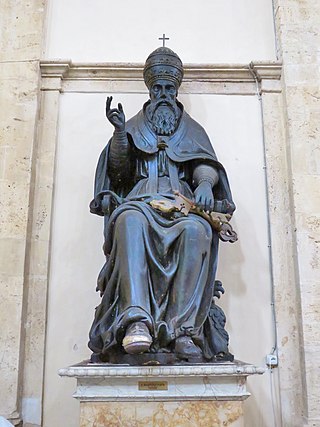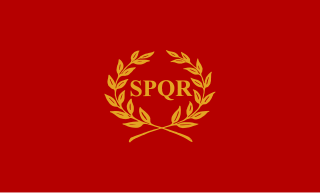New Rome is another name for Constantinople.
Contents
New Rome may also refer to:
New Rome is another name for Constantinople.
New Rome may also refer to:

Constantinople became the capital of the Roman Empire during the reign of Constantine the Great in 330. Following the collapse of the Western Roman Empire in the late 5th century, Constantinople remained the capital of the Eastern Roman Empire, the Latin Empire (1204–1261), and the Ottoman Empire (1453–1922). Following the Turkish War of Independence, the Turkish capital then moved to Ankara. Officially renamed Istanbul in 1930, the city is today the largest city in Europe, straddling the Bosporus strait and lying in both Europe and Asia, and the financial center of Turkey.

Pope Martin I, also known as Martin the Confessor, was the bishop of Rome from 21 July 649 to his death 16 September 655. He had served as Pope Theodore I's ambassador to Constantinople, and was elected to succeed him as pope. He was the only pope when Constantinople controlled the papacy whose election had not awaited imperial mandate. For his strong opposition to Monothelitism, Pope Martin I was arrested by Emperor Constans II, carried off to Constantinople, and ultimately banished to Cherson. He is considered a saint by both the Catholic Church and the Eastern Orthodox Church, as well as the last pope recognised as a martyr.
Roman or Romans most often refers to:
Roma or ROMA may refer to:
Rome is the English name of the capital of Italy. The city, called Roma in Latin and Italian, was also the capital of the Roman Empire and the seat of the papacy.
New Rome was the original name given by the Roman emperor Constantine the Great to his new imperial capital in 330 CE, which was built as an expansion of the city of Byzantium on the European coast of the Bosporus strait.

The continuation, succession, and revival of the Roman Empire is a running theme of the history of Europe and the Mediterranean Basin. It reflects the lasting memories of power, prestige, and unity associated with the Roman Empire.

Nova Roma is an international Roman reconstructionist, cultural revivalist, and educational nonprofit organization formed in 1998, later incorporated in Maine. Nova Roma is dedicated to promoting "the restoration of classical Roman religion, culture, and virtues" and "shared Roman ideals".
Rome II may refer to:
Various entities have claimed to be or could be considered the new Roman Empire. These include but are not limited to:
The Roman Empire usually refers to the post-republican, autocratic government period of Roman civilization, centered on the city of Rome on the Italian peninsula from 27 BC to AD 330, and in Constantinople on the Bosporus from 330 to AD 1453.
Graeco-Roman paganism may refer to:
The city of Istanbul has been known by a number of different names. The most notable names besides the modern Turkish name are Byzantium, Constantinople, and Stamboul. Different names are associated with different phases of its history, with different languages, and with different portions of it.
Nova Roma is a Roman reconstructionist organization.
Second Rome most commonly refers to Constantinople, which was the capital of the Roman Empire from 330 onwards, lasting as the capital for the subsequent Byzantine Empire until its fall in 1453. The term may also refer to:
Constantinople is the historic city name of present-day Istanbul in Turkey, formerly known as Byzantium.
Imperial Capital may refer to:
Fall of Rome may refer to:

Moscow, third Rome is a theological and political concept asserting Moscow as the successor to ancient Rome, with the Russian world carrying forward the legacy of the Roman Empire. The term "third Rome" refers to a historical topic of debate in European culture: the question of the successor city to the "first Rome" and the "second Rome".
Emperor Philip may refer to: